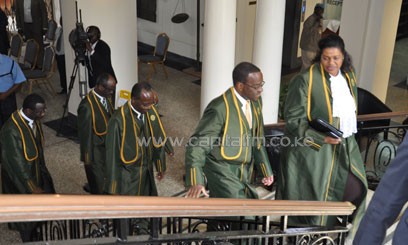 |
|
The
commission’s counsel Nani Mungai accused the petitioners’ lawyers of
tainting and undermining IEBC in their quest to have their client – the
Prime Minister Raila Odinga – get into power/ALI ALALE
“The petitioner through his advocate told us what this case is about. They need to claw just 8,400 votes from Kenyatta and if they do, there is a re-run. So we have a petitioner who uses clever interpretation to (confuse) Kenyans just so that he can get a second bite at the cherry,” he claimed.
Nani also denied allegations that IEBC used different registers to aid the Jubilee candidate to win the election.
He told the court that the petitioners failed to consider people with special needs such as those without hands or biometric features who are registered under a special register.
“We should not disenfranchise voters for lacking finger prints. The number of registered voters that appears in the listings of the biometric are those that were captured in the biometric register. You will not have those who do not have finger prints and you will not have those whose names may have been lost completely and may not have been recovered,” he explained.
He said IEBC had not violated the law since it used the reference book which is allowed by the Constitution.
He said names of 36,000 voters without finger prints are contained in a special list which is not in the biometric list.
“If there is anybody who is taking us to the dark days is the petitioner. The petitioner has told you the only people who should be in the voters’ list are those in the biometric register. What the petitioner is using is restrictive to try and shut out who are in the special register,” he alleged.
Nani further clarified that IEBC had a backup in the green book just in case voters registered using the Biometric Voter Registration (BVR) kits failed.
He explained that there were inconsistencies in the list of those registered in the BVR list and those in the green book.
“People who voted were either in green book, special list or electronic register. Since those people were dully registered, they were allowed to vote. The petitioner excluded to take into account the numbers in the special register,” he explained.
According to the counsel, the BVR kits were also not enough and were being shared in areas like Turbo where two polling stations used one kit.
He said the commission had only 14,000 BVR kits yet there were 33,000 polling stations.
He denied that there were plans or intentions to disfranchise any voter and that all undertakings by the commission were meant to ensure every legible Kenyan got a chance to vote.
He said IEBC closely consulted stakeholders in the election including political parties who also approved use of the green book.
“The process put in place was robust, it was simple, it was verifiable and it was transparent. On voting day no political party agent objected to anyone voting using the green book. And there is a reason for that. They had been informed about in the meetings I had indicated to you,” he explained.
He said that the BVR system failed to an extent that it indicated zero number of registered voters which was the reason that IEBC resulted to the reference register in such instances.
Earlier another IEBC Lawyer Paul Nyamodi told the Supreme Court judges that despite massive system failures, including losing voter registration data from laptops, the IEBC was able to conduct an election using back up data.
Nyamodi said most of the prayers sought by the petitioner were outrageous, including holding a fresh election within 60 days using a new commission.
Mohammed Nyaoga also representing IEBC said since Odinga’s petition termed the IEBC as having conducted a fraudulent election, another election can only be held using a new voters’ register.
He also said it may be impossible for the petitioner to allow IEBC to conduct another election if a re-run is ordered.
“If you are terming acts of IEBC fraudulent you are basically saying that if this court orders a fresh election, you will not go to that election with that register. If it is tainted, they will also not go to another election with current IEBC,” he asserted.
Nyaoga said it will be impossible to have a new register within two months and also reconstitute IEBC within that time as he urged the Supreme Court to reject the petition.
Lucy Kambuni also an IEBC counsel was next to defend the commission in the ongoing hearing of the case challenging the election of Kenyatta.
No comments:
Post a Comment